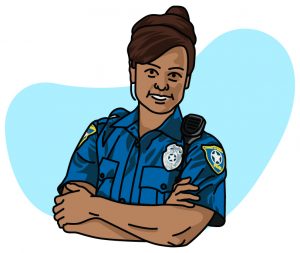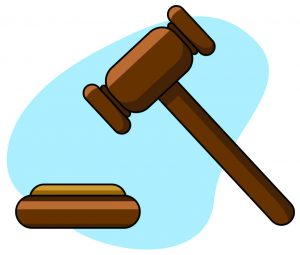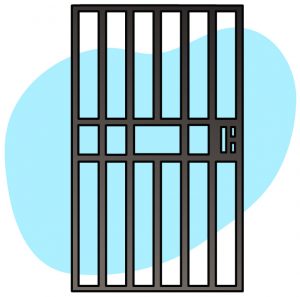The United States’ criminal justice system is designed to enforce laws, ensure public safety, and deliver justice to those who have committed crimes. It is comprised of government bureaus, private agencies, and overarching policies that all work together to maintain order in our communities. While there are many moving parts, there are three major components of the criminal justice system. These all play an important role in keeping the public safe:
- Law Enforcement
- Courts
- Corrections
If you are interested in a career in the criminal justice or law enforcement field, it is important to understand the basic structures that make up the criminal justice system. Below, we discuss each component in-depth and delve into the importance of each professional working within the system.
Law Enforcement

Law enforcement is the first pillar of the criminal justice system, because it is the system that individuals first encounter when they go against the law. It is also the most visible system to society, because we see law enforcement officers every day.
Law enforcement is made up of police officers, sheriffs, deputies, criminal investigators, detectives, and government agents who work to enforce legal policies and protect our communities. These officers investigate crimes, gather evidence, and take reports on criminal activity. Law enforcement officers may also detain offenders, give testimony in court, and continue investigating cases after making an arrest.
Law enforcement officers are critical to keeping the public safe. Their primary goal is to maintain order in their communities, ensure citizens are protected, and arrest any individuals who break the law. When an individual is arrested, that person will then enter the court system.
Courts

The court system determines whether suspects are innocent or guilty for a given crime, and delivers justice to the person based on that ruling. There are both local and federal courts within this system. Local state courts handle matters like traffic violations, family disputes, and local criminal cases, while federal courts may handle larger cases that involve multiple regions or waterways.
All courts are overseen by judges, whose main role is to ensure the rule of law is followed and to adjudicate what happens to each offender in question. Along with a team of juries, judges hear evidence presented by attorneys who argue for the guilt or innocence of the accused. There are both defense attorneys and prosecution lawyers, who fight for or against the suspected criminal. Judges also oversee trials, accept or reject plea agreements, and determine the severity of sentences for those convicted of a crime. Suspects who are determined guilty in court enter the corrections system after sentencing.
Corrections

The third component of the criminal justice system is corrections, which handles the sentencing and punishment of offenders, as adjudicated in court. After offenders are convicted in the courts, the corrections system will separate them from the rest of society. Offenders may be incarcerated in prison or put on probation/parole, where they will be monitored closely by dedicated officers.
Corrections officers supervise convicted offenders who are serving sentences in prison. Probation officers are responsible for offenders who need to be monitored by court, in lieu of serving jail time. Parole officers supervise offenders who are released from prison early, ensuring they adhere to their parole terms (such as regular drug testing, staying in one location, and avoiding criminal behavior).
Corrections officers also play a key role in rehabilitating criminal offenders. Their main goal is to provide a system where those accused of a crime are monitored, reformed, and released if and when ready, to hopefully not commit a crime again. These professionals make sure that correctional facilities are safe and secure, and oversee the day-to-day routines of inmates. Probation and parole officers play an important role in helping people re-adjust to mainstream life, and enter society at a functional level after (or instead of) serving time.
Which Criminal Justice System is Calling You?
Within the three pillars of criminal justice, there are many career options. Depending on your professional goals and where your interests lie, you can find success within law enforcement, courts, or corrections.
A career in law enforcement means protecting the streets of your community. You may become a police officer, sheriff, deputy, state trooper, crime scene investigator, private detective, or even federal agent (such as an FBI, DEA, or border patrol agent). Each law enforcement career has different requirements. For example, federal agents often need a degree in a related field like criminal justice or public safety.
Police officers, on the other hand, are not always required to complete higher education. However, research shows that law enforcement officers who obtain a college degree are more effective at their job. Specifically, college-educated officers are less likely to use force, less likely to be terminated for misconduct, receive fewer citizen complaints, and in general, have better relationships with their communities.
Within the court system, you can become an attorney, prosecutor, bailiff, magistrate, court reporter, judge, paralegal, or court clerk. Most career paths within the U.S. court system also require higher education, though this will vary depending on the pursued title. All professionals in court need to have foundational knowledge of the U.S. criminal justice system, and the structures and policies in place.
If you wish to help supervise, reconcile, and rehabilitate criminal offenders, you may pursue a career in corrections. As noted above, the common career paths in this pillar of criminal justice are probation officers, parole officers, and corrections officers who work within prisons and jails. While a college education is not always needed for these positions, criminal justice training is always recommended. Additionally, federal agencies typically require corrections officers to hold a criminal justice degree.
Goodwin University is recognized as a leading criminal justice school in Connecticut. Here, we have multiple programs focused on the criminal justice system – at the associate and bachelor’s degree level:
- Criminal Justice (Associate Degree)
- Public Safety and Security (Bachelor’s Degree)
Each program offers the chance to work alongside real professionals within the criminal justice system. Students in Goodwin’s criminal justice programs have participated in internships with the American Red Cross; Cheshire Correctional Institute; Community Court at Hartford; Community Partners in Action; Connecticut Adult Probation; the Department of Emergency Management and Homeland Security; the Department of Emergency Services and Public Protection; the Department of Health; fire department; police departments; and the Connecticut court system.
If you are interested in a criminal justice career in Connecticut, you can start your journey right here at Goodwin. Learn more today by calling 800-889-3282 or requesting more information online.
Goodwin University is a nonprofit institution of higher education and is accredited by the New England Commission of Higher Education (NECHE), formerly known as the New England Association of Schools and Colleges (NEASC). Goodwin University was founded in 1999, with the goal of serving a diverse student population with career-focused degree programs that lead to strong employment outcomes.

